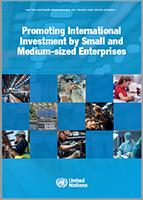
Small and medium-size enterprises (SMEs) are important contributors to economic development, representing a substantial portion of businesses globally. Global markets offer SMEs opportunities for growth, diversification and resilience. Access to international markets enables them to tap into new customer bases, gain exposure to diverse business practices and foster innovation through cross-cultural collaboration.
However, SMEs encounter significant challenges that hinder their investment overseas. SME investors, relative to large Multinational Enterprises (MNEs), face distinctive bottlenecks including financial and information constraints, difficulties in dealing with regulatory complexities and, importantly, an international investment environment in which facilitation and investment promotion institutions are often geared towards attracting large-scale investment projects. Foreign direct investment (FDI) by SMEs has been in decline in recent years: the number of outward greenfield investment projects in 2022 was only about a quarter of that in 2015.
There are good reasons for governments and investment promotion institutions to pay more attention to supporting SME investment. SME investment can be most beneficial for development because it is less footloose, relies more on local suppliers and partners, and is less likely to crowd out local firms. SMEs can become real game changers in a global context characterized by greater competition for a shrinking pool of large-scale projects; a general trend towards regionalization and international tax reforms that will reduce the effectiveness of incentives for large MNEs.
Based on original empirical studies in different developing regions and selected developed economies, this report discusses how to reduce the common investment policy bias in home and host countries towards large MNEs, the role of SMEs in South–South and intraregional FDI, and ways and means to maximize the development impact of SME FDI. It introduces a new framework to assess the relevance and effectiveness of existing investment policies for the promotion of SME investment and presents policy options to facilitate overseas investment by SMEs and reduce the existing policy bias, including these six:
- Adjusting investment promotion and facilitation services towards addressing the needs and challenges that SMEs face, so that size does not hinder their access to financial incentives and facilitation mechanisms.
- Establishing comprehensive support networks and designing accessible matchmaking programmes and events to help small businesses connect and to foster sustained and successful.
- Improving SMEs’ competitiveness by supporting their innovation capacity, including through digitalization, technology adoption and capacity-building.
- Facilitating SMEs’ access to capital, including by improving digital services and infrastructure.
- Simplifying the regulatory and administrative framework and improving access to information by using digital platforms.
- Promoting SMEs’ participation in trade to increase their international exposure and knowledge of foreign markets.
By implementing a combination of these policies, governments can create an environment that supports SMEs in their efforts to invest and thrive in international markets and to harness the related development benefits.


